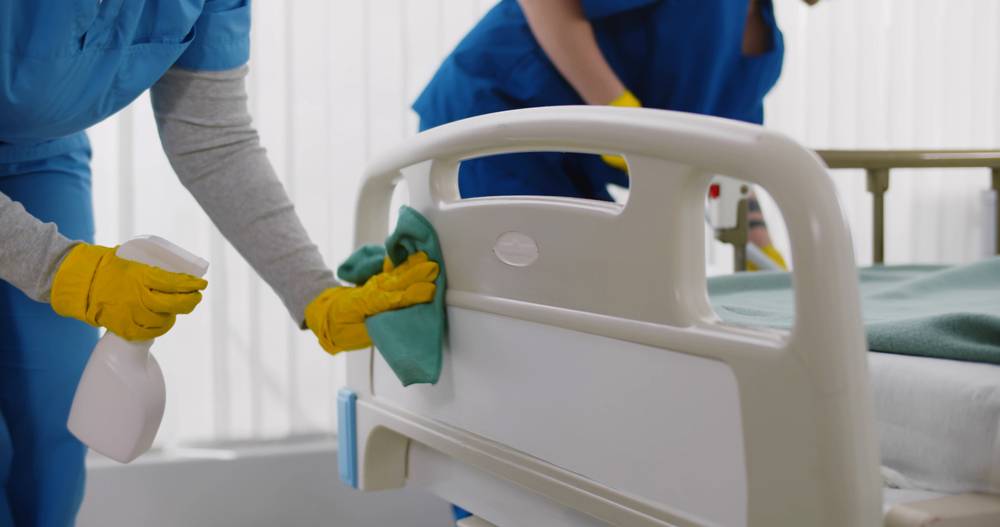Chlorine-Based Disinfectants Ineffective Against C. difficile: Rethinking Hospital Sanitisation Strategies
In a recent study, the resilient nature of Clostridioides difficile (C. difficile), a notorious superbug, against chlorine-based disinfectants, specifically highlighting chlorine ineffectiveness against C. difficile, has raised significant concerns.
This bacterium, known for causing severe gastrointestinal infections, has demonstrated an alarming ability to withstand standard hospital-grade disinfectants.
The Stubborn Resistance of C. difficile
The resilience of C. difficile spores to disinfectants, particularly chlorine-based solutions, is a major healthcare challenge. Notoriously stubborn, these spores survive on surfaces for extended periods, posing a constant threat of infection in hospitals and care facilities.
Traditional cleaning agents, while effective against many pathogens, fall short in eradicating C. difficile, demanding a reevaluation of current sanitisation practices.
Study Reveals Disinfectant Resistance
C. difficile is a Gram-positive, spore-forming bacterium that is the leading cause of antibiotic-associated diarrhoea worldwide.
The study focused on the sporicidal efficacy of sodium hypochlorite, a chlorine-releasing agent (CRA), against C. difficile spores. Researchers exposed spores to sodium hypochlorite at concentrations of 1000, 5000, and 10,000 parts per million (p.p.m.) for a 10-minute contact time. The spore recovery post-exposure was then determined.
Alarmingly, the study found that viable C. difficile spores could still be recovered from surgical scrubs and patient gowns after exposure to these biocides, clearly indicating Chlorine Ineffectiveness Against C. difficile. This finding reveals that the spores are capable of surviving recommended concentrations of sodium hypochlorite, a commonly used chlorine-releasing agent in hospital settings
Implications for Hospital Cleaning Protocols
This newfound understanding of C. difficile’s disinfectant resistance necessitates a reevaluation of hospital cleaning protocols. The traditional reliance on chlorine-based cleaners needs reconsideration, given their ineffectiveness against C. difficile spores. The study calls for the development of more effective disinfectants and a shift in sanitisation strategies to combat this resilient superbug effectively.
The recent study uncovering the resilience of C. difficile spores to sodium hypochlorite, a standard disinfectant used in hospitals, has significant implications for hospital cleaning protocols. This revelation challenges the efficacy of current disinfection methods, particularly for C. difficile, which is notorious for its spore-forming ability and resistance to biocides.
The ability of these spores to survive on surfaces and fabrics commonly found in clinical environments, such as surgical scrubs and patient gowns, even after exposure to recommended concentrations of disinfectants, highlights a critical vulnerability in infection control practices.
Hospitals must urgently reassess and update their cleaning protocols, considering alternative disinfection strategies like hydrogen peroxide fogging or UV-C treatment. This adaptation is essential for preventing the transmission of C. difficile infections within healthcare settings.
Understanding C. difficile Infections
The symptoms of C. difficile infection include:
- Watery diarrhoea
- Fever
- Loss of appetite
- Nausea
- Abdominal pain or tenderness
In severe cases, it can lead to pseudomembranous colitis, toxic megacolon, perforations of the colon, and sepsis.
Risk factors for C. difficile infection include:
- Antibiotic use
- Prolonged hospital stay
- Older age
- Immune-compromising conditions
- Previous C. difficile infections
Diagnosis and Treatment
Diagnosis typically starts with stool tests to detect the presence of toxins produced by C. difficile or its genetic material. PCR (polymerase chain reaction) testing is commonly used due to its high sensitivity and specificity. Once diagnosed, the initial approach to treatment generally involves discontinuing the inciting antibiotic, if possible. This is often followed by the administration of antibiotics specifically effective against C. difficile, such as vancomycin or fidaxomicin. Fidaxomicin, in particular, has been shown to have a lower recurrence rate compared to vancomycin.
Fecal Microbiota Transplantation (FMT) has become a significant treatment option for recurrent infections. This innovative approach involves transferring fecal matter from a healthy donor into the patient’s colon, with the primary goal of restoring a balanced and healthy gut microbiota. Notably, FMT has shown remarkable effectiveness in the treatment of recurrent Clostridium difficile (C. difficile) infections. Consequently, it is increasingly gaining recognition and consideration in clinical practice for its therapeutic potential.
Addressing the Challenge of C. difficile in Healthcare Environments
The recent discovery of C. difficile resistance to chlorine-based disinfectants represents a pivotal moment in our understanding of hospital-acquired infections. The stubborn endurance of C. difficile spores against commonly used sanitisation methods challenges the efficacy of current cleaning protocols in healthcare settings. This situation highlights the urgent need for the development of new disinfectants and the adoption of alternative sanitisation strategies, such as hydrogen peroxide vapour or UV-C light treatment. As we continue to combat the spread of this formidable superbug, it is imperative to remain vigilant in researching innovative methods to curb its transmission. Hospitals and healthcare facilities must adapt swiftly to these findings by revising their cleaning protocols, not only to protect patients, but also to safeguard the health of the broader community.
References
- Guery, B., Galpérine, T., & Barbut, F. (2019, August 20). Clostridioides difficile: diagnosis and treatments. BMJ. https://doi.org/10.1136/bmj.l4609
- Chlorine disinfectant is no more effective than water at killing off hospital superbug. (2023, November 23). ScienceDaily. https://www.sciencedaily.com/releases/2023/11/231121221002.htm
- Tariq, R., Disbrow, M., DiBaise, J. K., Orenstein, R., Saha, S., Solanky, D., Loftus, E. V., Pardi, D. S., & Khanna, S. (2019, December 9). Efficacy of Fecal Microbiota Transplantation for Recurrent C. Difficile Infection in Inflammatory Bowel Disease. Inflammatory Bowel Diseases. https://doi.org/10.1093/ibd/izz299
- Ramesh, A. S., Tello, C. M., Jamil, D., Tran, H. H. V., Mansoor, M., Butt, S. R., Satnarine, T., Ratna, P., Sarker, A., & Khan, S. (2022, August 25). Role of Fecal Microbiota Transplantation in Reducing Clostridioides difficile Infection-Associated Morbidity and Mortality: A Systematic Review. Cureus. https://doi.org/10.7759/cureus.28402
- Redefining Clostridioides difficile infection antibiotic response and clinical outcomes. (n.d.). Retrieved November 26, 2023, from https://www.thelancet.com/journals/laninf/article/PIIS1473-3099(23)00047-6/fulltext
- Ahmed, H. (2023, November 23). Clostridioides difficile spores tolerate disinfection with sodium hypochlorite disinfectant and remain viable within surgical scrubs and gown fabrics: This article is part of the Diversity in Microbiology collection. microbiologyresearch.org. https://doi.org/10.1099/mic.0.001418













